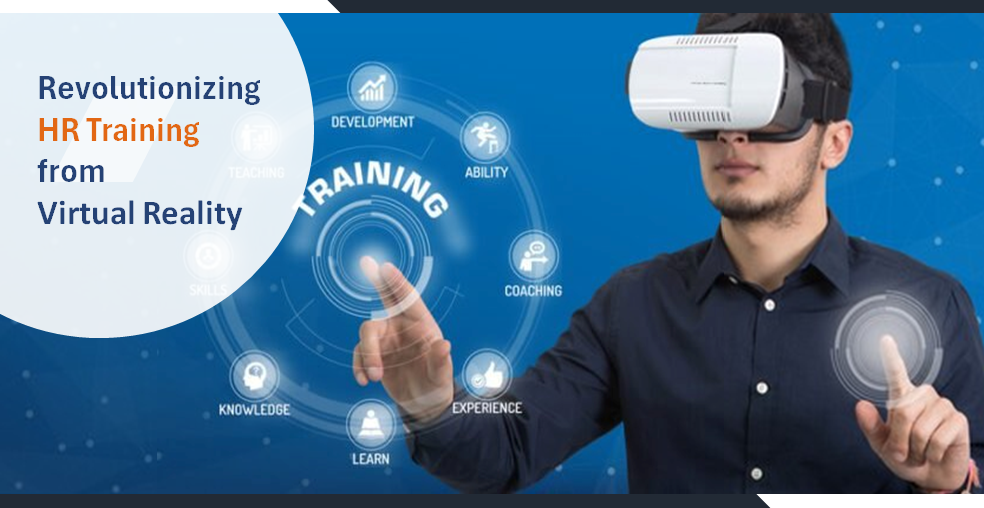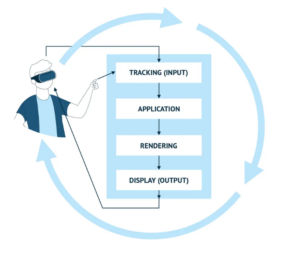Home » Revolutionizing HRM: How VR is Changing Employee Training and Recruitment?

Human Resource Management (HRM) is undergoing a profound transformation with the integration of innovative technologies. Among these technologies, Virtual Reality (VR) stands out as a game-changer, offering new possibilities for employee training and recruitment. In this blog post, we’ll explore how VR is revolutionizing HRM practices, enhancing employee learning experiences, and streamlining the recruitment process. HRM is a rapidly growing field, offering promising career prospects with higher education and relevant qualifications (BBA and MBA from Human Resource Management).
Virtual Reality (VR) technology immerses users in a simulated environment, allowing them to interact with digital content in a realistic and immersive manner. While VR has traditionally been associated with entertainment and gaming, its applications in business settings, particularly in HRM, are becoming increasingly prevalent.
In the realm of employee training, VR offers a unique opportunity to create immersive learning experiences that engage employees and facilitate skill development. By simulating real-world scenarios, VR enables employees to practice tasks, receive feedback, and gain hands-on experience in a safe and controlled environment. From customer service simulations to safety training exercises, VR-based training programs are revolutionizing the way organizations educate and empower their workforce.
A New Frontier in Human Resource Management

Traditional training methods often struggle to captivate learners and provide meaningful, hands-on experiences. In contrast, VR-based training programs offer a high level of interactivity and engagement, making learning more effective and enjoyable for employees. For example, in industries such as healthcare and manufacturing, VR simulations allow employees to practice complex procedures and tasks without risking injury or damage to equipment.
Furthermore, VR-based training programs can be customized to meet the specific needs and learning objectives of individual employees or teams. Whether it’s providing immersive language training for international staff or simulating high-stress situations for crisis management training, VR technology offers unparalleled flexibility and adaptability in designing training programs.
In addition to employee training, VR is also transforming the recruitment process by offering innovative solutions for candidate assessment and engagement. Virtual reality enables recruiters to create immersive experiences that showcase the company culture, values, and work environment, allowing candidates to gain a deeper understanding of what it’s like to work for the organization.
For example, companies can use VR to create virtual tours of their offices, giving candidates a glimpse into the workplace atmosphere and facilities. Additionally, VR-based assessment tools can be used to evaluate candidates’ skills, competencies, and cultural fit through interactive simulations and scenarios. By leveraging VR in recruitment processes, organizations can attract top talent, reduce time-to-hire, and improve candidate experience.
Fostering Innovation and Empowering Success
Several companies have already embraced VR technology in their HRM practices and witnessed tangible benefits. For instance, global retailer Walmart utilizes VR simulations to train employees in customer service skills, resulting in improved performance and customer satisfaction. Similarly, multinational technology company Cisco Systems uses VR-based recruitment experiences to attract and engage candidates, enhancing their employer brand and recruitment outcomes.
Conclusion:
In conclusion, Virtual Reality (VR) is revolutionizing HRM practices, offering new opportunities for employee training and recruitment. By providing immersive learning experiences and interactive recruitment processes, VR technology enables organizations to enhance employee skills, engage candidates, and drive business success. As VR adoption continues to grow, HR professionals must embrace this transformative technology to stay ahead of the curve and unlock the full potential of their workforce.
From
Shivangi Priya
Research Assistant
School of Commerce and Management
Lingaya’s Vidyapeeth
Best MBA Colleges In Faridabad
RECENT POSTS
CATEGORIES
TAGS
Agriculture Agriculture future AI Architecture artificial intelligence BA English BA Psychology BTech Engineering Business management career Career-Specific Education career guide Career Opportunities career option career scope Civil engineering commerce and management Computer Science Computer science engineering Data science degree education Engineering engineering college Engineering students English Literature english program Exam tips Fashion Design Fashion design course Higher Education Journalism journalism and mass communication law Law career Machine Learning MA Psychology Master degree mathematics MBA Mechanical Engineering Pharmacy Psychology Research and Development students
University Address: Nachauli, Jasana Road, Faridabad, Haryana
Toll Free: 1800-120-4613
Mobile : 8447744303 | 8447744304 | 8447744306 | 8447744309
Address: C-72, Second Floor, Shivalik, Near Malviya Nagar,
Above HDFC Bank, New Delhi 110017
Ph.No. - 011-46570515 / 45138169 / 41755703 / +91-7303152412
Jagmani Kutir, Ground Floor, Road No-1, Rajeev Nagar,
Near Darbar Marriage Hall, Patna-800024, Bihar
Contact No: 9818352069/8130120095
Mail: [email protected]
Copyrights © 1998 - 2025 Lingaya's Vidyapeeth (Deemed To Be University). All rights reserved.
It is important to note that the following email IDs and domains are fraudulent and do not belong to our university.
LV only conducts physical/online verification of any document related to examination on the following email id: